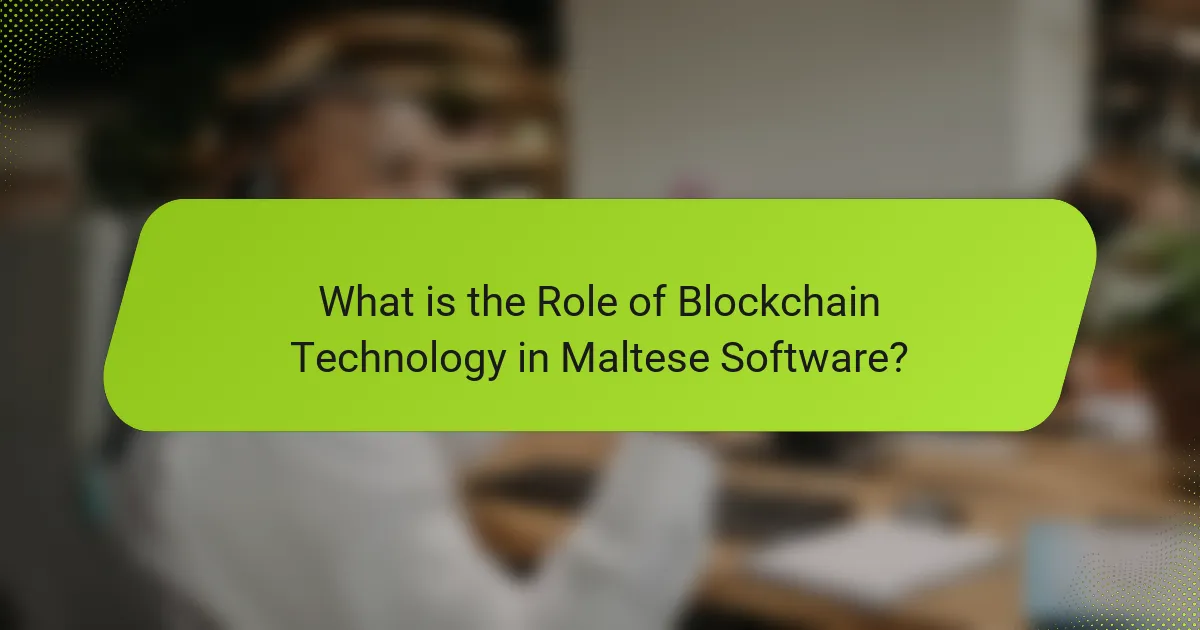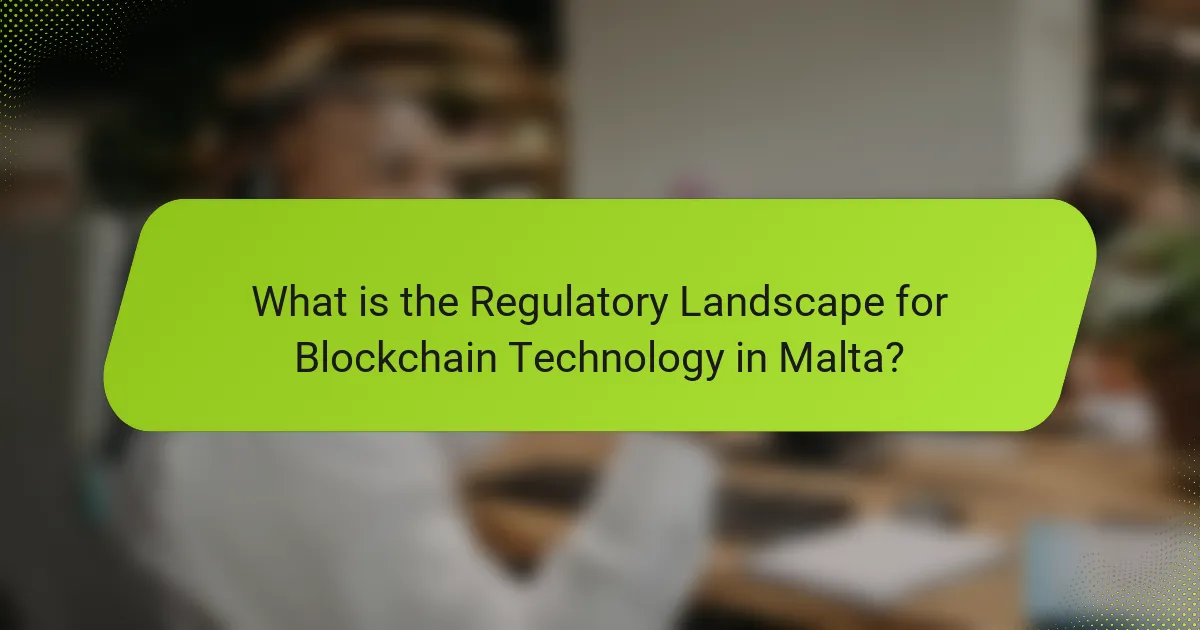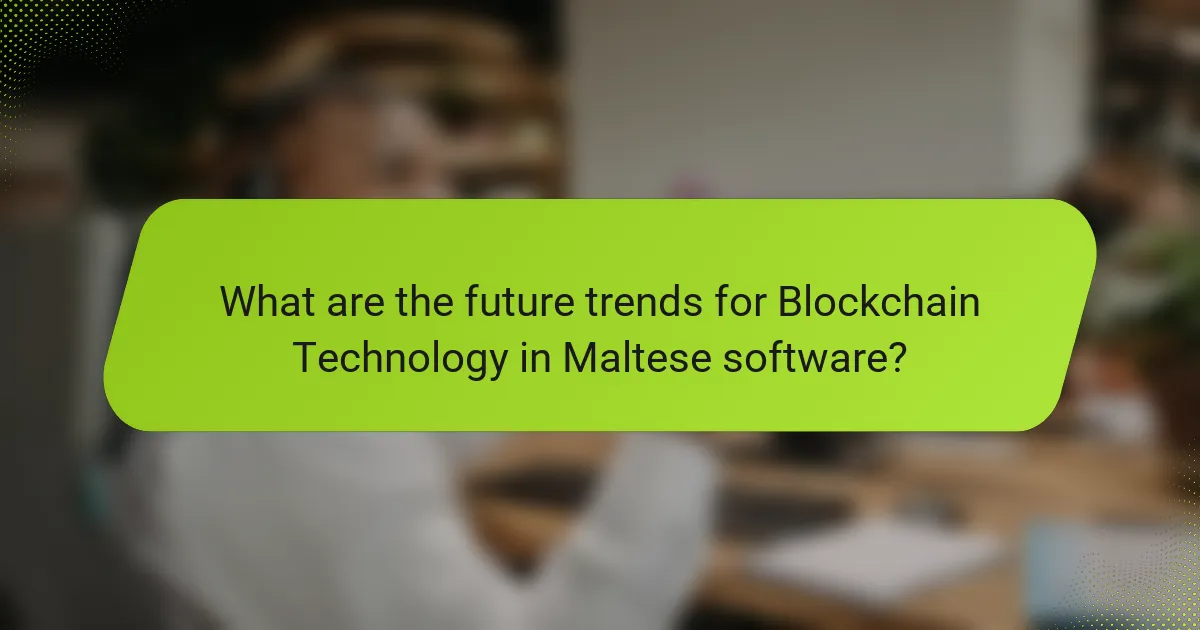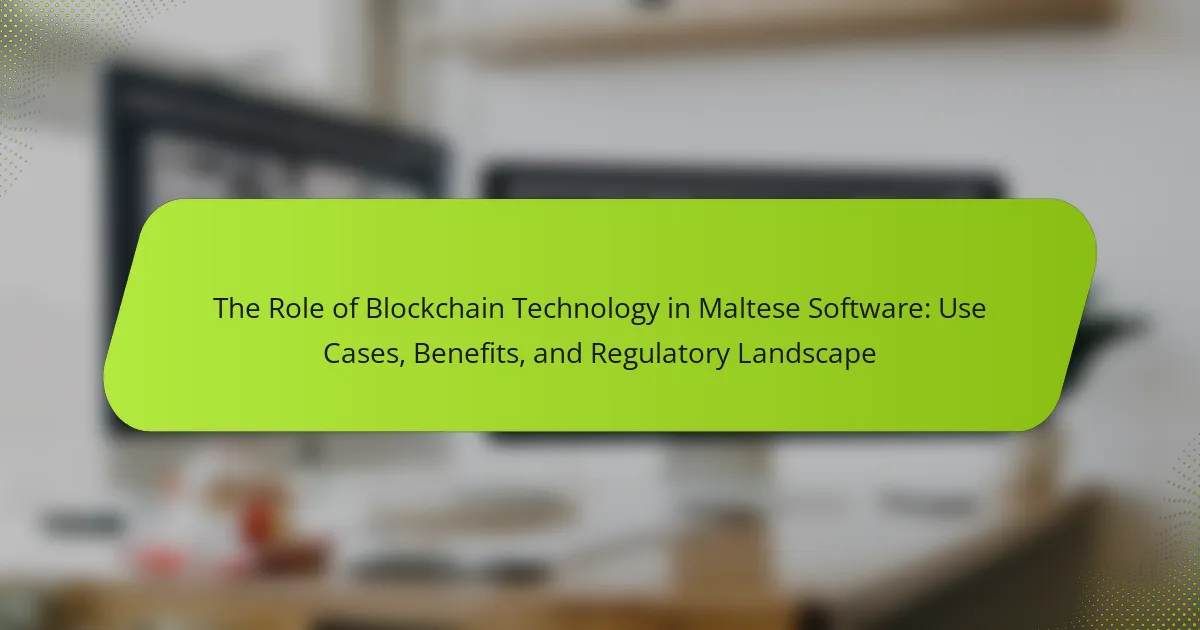
What is the Role of Blockchain Technology in Maltese Software?
Blockchain technology plays a crucial role in Maltese software development. It enhances security through decentralized data storage. This technology ensures transparency in transactions and data management. Malta’s regulatory framework supports blockchain integration in various sectors. The Maltese government promotes blockchain to attract tech investment. Numerous Maltese companies implement blockchain for efficient supply chain solutions. Blockchain also aids in identity verification and digital contracts. These applications highlight the growing importance of blockchain in the Maltese software landscape.
How does Blockchain Technology integrate with software development in Malta?
Blockchain technology integrates with software development in Malta by enhancing transparency and security in applications. Developers in Malta leverage blockchain for smart contracts, which automate processes and reduce errors. This integration supports various sectors, including finance, healthcare, and supply chain management. Malta’s regulatory framework encourages blockchain adoption, providing legal clarity for developers. The Malta Digital Innovation Authority oversees compliance and standards. This regulatory support fosters innovation and attracts investment in blockchain projects. As a result, Malta is emerging as a hub for blockchain-based software solutions. The country’s proactive stance on technology positions it favorably in the global market.
What specific features of Blockchain enhance software applications?
Blockchain enhances software applications through decentralization, transparency, security, and immutability. Decentralization eliminates the need for a central authority. This feature increases reliability and reduces the risk of single points of failure. Transparency ensures that all transactions are visible to participants. This openness fosters trust among users and stakeholders. Security is strengthened by cryptographic techniques that protect data from unauthorized access. Immutability guarantees that once data is recorded, it cannot be altered or deleted. This feature is crucial for maintaining data integrity. Collectively, these attributes improve software applications by enhancing trustworthiness and operational efficiency.
How does Blockchain ensure data integrity and security in Maltese software?
Blockchain ensures data integrity and security in Maltese software through its decentralized and immutable nature. Each transaction is recorded in a block, which is linked to the previous block, creating a secure chain. This structure makes it nearly impossible to alter any data without consensus from the network.
In Malta, blockchain’s transparency allows all participants to verify transactions independently. This reduces the risk of fraud and enhances trust among users. Additionally, cryptographic techniques protect data, ensuring that only authorized users can access sensitive information.
According to the Maltese Digital Innovation Authority, blockchain technology supports compliance with data protection regulations. This ensures that software solutions can maintain high standards of security and integrity.
What are the primary use cases of Blockchain Technology in Maltese software?
Blockchain technology in Maltese software primarily serves use cases in financial services, supply chain management, and identity verification. In financial services, blockchain enhances transparency and security in transactions. Companies like the Malta Stock Exchange leverage blockchain for trading and settlement processes. In supply chain management, blockchain improves traceability and accountability of goods. Maltese firms utilize it to ensure product authenticity and reduce fraud. Identity verification applications use blockchain to secure personal data and streamline processes. Maltese authorities are exploring blockchain for secure digital identities, enhancing trust in online transactions.
Which sectors in Malta are adopting Blockchain solutions?
The sectors in Malta adopting Blockchain solutions include finance, gaming, and supply chain management. The financial sector utilizes Blockchain for secure transactions and transparency. Gaming companies leverage Blockchain for fair play and secure betting systems. Supply chain management benefits from Blockchain’s ability to enhance traceability and reduce fraud. The Maltese government actively supports Blockchain adoption through regulatory frameworks. This environment fosters innovation and attracts international Blockchain businesses.
How are local businesses leveraging Blockchain for operational efficiency?
Local businesses are leveraging blockchain for operational efficiency by enhancing transparency and reducing transaction costs. Blockchain technology allows for secure and immutable record-keeping. This reduces the need for intermediaries in transactions. Consequently, businesses can process payments more quickly and at lower costs.
For instance, supply chain management benefits from blockchain by providing real-time tracking of goods. This leads to improved inventory management and reduced waste. Additionally, local businesses utilize smart contracts to automate processes. Smart contracts execute automatically when predefined conditions are met, streamlining operations.
According to a report by the World Economic Forum, blockchain could reduce supply chain costs by 20% to 30%. Such data supports the effectiveness of blockchain in improving operational efficiency for local businesses.
What benefits does Blockchain Technology bring to Maltese software?
Blockchain technology enhances Maltese software by providing increased security, transparency, and efficiency. It offers a decentralized framework that minimizes the risk of data breaches. Transactions recorded on the blockchain are immutable, ensuring data integrity. This technology facilitates real-time auditing and verification of transactions. It also streamlines processes by reducing the need for intermediaries. Furthermore, blockchain can improve traceability in supply chains, enhancing accountability. The adoption of blockchain can lead to cost savings for businesses in Malta. These benefits position Maltese software to innovate and compete globally.
How does Blockchain improve transparency and trust among users?
Blockchain improves transparency and trust among users by creating an immutable ledger of transactions. Each transaction is recorded in a block and linked to previous blocks, forming a chain. This structure ensures that once data is entered, it cannot be altered or deleted. Users can verify transactions independently without relying on a central authority. This decentralization reduces the risk of fraud and manipulation. Additionally, blockchain’s use of cryptographic techniques secures data and enhances privacy. Studies show that businesses using blockchain report increased trust from customers and partners. For example, a Deloitte survey found that 82% of executives believe blockchain will enhance trust in business transactions.
What cost-saving opportunities does Blockchain offer to Maltese companies?
Blockchain offers Maltese companies several cost-saving opportunities. It reduces transaction costs by eliminating intermediaries in financial processes. Companies can automate processes through smart contracts, decreasing labor costs. Enhanced transparency minimizes fraud and errors, leading to fewer losses. Blockchain’s decentralized nature lowers infrastructure expenses by reducing the need for centralized data storage. Additionally, companies can streamline supply chain management, reducing logistics costs. According to a report by the European Commission, blockchain can save businesses up to 30% on operational costs. These factors collectively contribute to significant savings for Maltese companies.

What is the Regulatory Landscape for Blockchain Technology in Malta?
The regulatory landscape for blockchain technology in Malta is defined by comprehensive legislation. Malta has established a legal framework that supports blockchain innovation. The Virtual Financial Assets Act (VFAA) regulates initial coin offerings and cryptocurrency exchanges. The Technology Arrangements and Services Act (TASA) provides guidelines for blockchain-based services. The Innovative Technology Arrangements and Services Act (ITAS) offers a framework for distributed ledger technology applications. Malta’s regulatory authority, the Malta Financial Services Authority (MFSA), oversees compliance and licensing. This environment fosters a secure and transparent ecosystem for blockchain enterprises. Malta aims to position itself as a global blockchain hub.
How does the Maltese government approach Blockchain regulation?
The Maltese government adopts a proactive approach to blockchain regulation. It aims to create a clear legal framework for blockchain technology. This framework includes the Virtual Financial Assets Act, which was enacted in 2018. The Act regulates initial coin offerings and cryptocurrency exchanges. Additionally, the government established the Malta Digital Innovation Authority to oversee blockchain projects. This authority ensures compliance with regulatory standards. Malta’s approach is designed to attract blockchain businesses and foster innovation. The government emphasizes transparency and consumer protection in its regulations.
What laws and guidelines are in place for Blockchain-based software?
Maltese laws and guidelines for blockchain-based software include the Virtual Financial Assets Act (VFAA) and the Malta Digital Innovation Authority Act (MDIA). The VFAA regulates initial coin offerings and provides a framework for cryptocurrency exchanges. It aims to ensure consumer protection and promote innovation. The MDIA oversees the certification of blockchain technology and establishes standards for software development. Additionally, the Anti-Money Laundering (AML) regulations apply to blockchain activities to prevent illicit transactions. These regulations create a secure environment for blockchain applications in Malta.
How does Malta’s regulatory framework compare to other jurisdictions?
Malta’s regulatory framework for blockchain technology is among the most progressive globally. It offers clear guidelines for businesses operating in the blockchain space. The framework is designed to foster innovation while ensuring consumer protection. Malta’s approach contrasts with jurisdictions that have ambiguous or restrictive regulations. For example, countries like the United States have a patchwork of state regulations. In contrast, Malta provides a comprehensive legal structure under the Malta Digital Innovation Authority. This includes specific laws for distributed ledger technology and initial coin offerings. Malta’s framework has attracted numerous blockchain companies seeking regulatory clarity. As of 2023, Malta has issued over 30 licenses related to blockchain operations. This proactive stance positions Malta as a leader in the blockchain regulatory landscape.
What challenges do developers face in complying with Blockchain regulations?
Developers face several challenges in complying with blockchain regulations. One major challenge is the lack of clear guidelines from regulatory bodies. This uncertainty can lead to difficulties in understanding compliance requirements. Additionally, regulations often vary significantly between jurisdictions. Developers must navigate these differences to ensure compliance in multiple regions. Another challenge is the rapidly evolving nature of blockchain technology. Regulations may lag behind technological advancements, creating gaps in compliance. Furthermore, developers must address issues related to data privacy and security. Compliance with data protection laws can be complex in a decentralized environment. Finally, the cost of compliance can be a burden for developers, particularly for startups. These challenges collectively hinder the effective implementation of blockchain solutions within the regulatory framework.
What are the common compliance issues encountered by Maltese software firms?
Maltese software firms commonly encounter compliance issues related to data protection, intellectual property, and anti-money laundering regulations. Data protection issues arise from the need to adhere to the General Data Protection Regulation (GDPR). This regulation mandates strict guidelines on how personal data is handled and processed. Intellectual property compliance involves ensuring that software products do not infringe on existing patents or copyrights. Firms must navigate the complexities of local and international laws regarding software licensing and usage rights. Anti-money laundering compliance is crucial as firms must implement measures to prevent financial crimes. This includes conducting thorough customer due diligence and reporting suspicious activities. These compliance challenges are exacerbated by the rapid evolution of technology and regulatory frameworks.
How can companies navigate the regulatory landscape effectively?
Companies can navigate the regulatory landscape effectively by staying informed about regulations and engaging with regulatory bodies. Regularly reviewing compliance requirements is essential for understanding obligations. Developing a compliance strategy tailored to specific regulations aids in systematic adherence. Training employees on regulatory standards fosters a culture of compliance within the organization. Utilizing technology, such as compliance management systems, streamlines tracking and reporting processes. Collaborating with legal experts ensures accurate interpretation of complex regulations. Participating in industry associations provides insights into best practices and upcoming regulatory changes. These strategies help companies maintain compliance and reduce the risk of penalties.

What are the future trends for Blockchain Technology in Maltese software?
Future trends for blockchain technology in Maltese software include increased adoption in various sectors. The financial services sector is likely to leverage blockchain for enhanced security and transparency. Supply chain management will also benefit from improved traceability and efficiency. Additionally, Malta’s regulatory framework will attract more blockchain startups. Integration with emerging technologies like AI and IoT is expected to grow. Enhanced interoperability between different blockchain systems will become a priority. Furthermore, there will be a focus on sustainability and energy-efficient blockchain solutions. These trends indicate a robust future for blockchain in the Maltese software landscape.
How is the adoption of Blockchain expected to evolve in Malta?
The adoption of Blockchain in Malta is expected to grow significantly. The Maltese government has established a regulatory framework that supports Blockchain technology. This framework includes the Malta Digital Innovation Authority, which oversees Blockchain initiatives. Various sectors, including finance and gaming, are increasingly integrating Blockchain solutions. In 2020, Malta introduced the Virtual Financial Assets Act to regulate cryptocurrency activities. This legislation aims to create a safe environment for Blockchain innovation. Additionally, Malta’s strategic location in Europe enhances its appeal for Blockchain startups. Research indicates that Malta could become a leading Blockchain hub in the Mediterranean region.
What innovations in Blockchain could impact software development in the coming years?
Innovations in blockchain that could impact software development include advancements in smart contracts, interoperability, and scalability solutions. Smart contracts enable automated processes and reduce the need for intermediaries. Interoperability allows different blockchain networks to communicate, enhancing collaboration between platforms. Scalability solutions, such as sharding and layer-2 protocols, improve transaction speeds and efficiency. These innovations can lead to more robust and flexible software applications. For instance, Ethereum 2.0 aims to enhance scalability and security, which can transform decentralized application development. Additionally, the rise of decentralized finance (DeFi) applications showcases the potential of blockchain in creating new financial software solutions.
What practical tips can Maltese software developers follow when implementing Blockchain?
Maltese software developers should prioritize understanding blockchain fundamentals. They must familiarize themselves with consensus algorithms, smart contracts, and decentralized applications. Selecting the right blockchain platform is crucial. Developers should consider factors like scalability, security, and community support.
Implementing robust security measures is essential. This includes encryption and secure coding practices to protect sensitive data. Developers should also focus on interoperability with existing systems. This ensures seamless integration and enhances functionality.
Continuous education is important. Staying updated with blockchain trends and advancements will improve implementation strategies. Collaborating with other developers can provide valuable insights and foster innovation.
Finally, compliance with local regulations is necessary. Developers must ensure their blockchain solutions adhere to Malta’s legal framework. This mitigates risks and promotes trust in their applications.
The main entity of the article is Blockchain Technology in the context of Maltese Software. The article provides an in-depth analysis of how blockchain technology enhances software development in Malta by improving security, transparency, and operational efficiency across various sectors, including finance and supply chain management. It discusses specific use cases, such as smart contracts and identity verification, while highlighting the regulatory landscape that supports blockchain integration. Additionally, the article addresses the benefits of blockchain, including cost savings and data integrity, as well as the challenges developers face in compliance with regulations.
